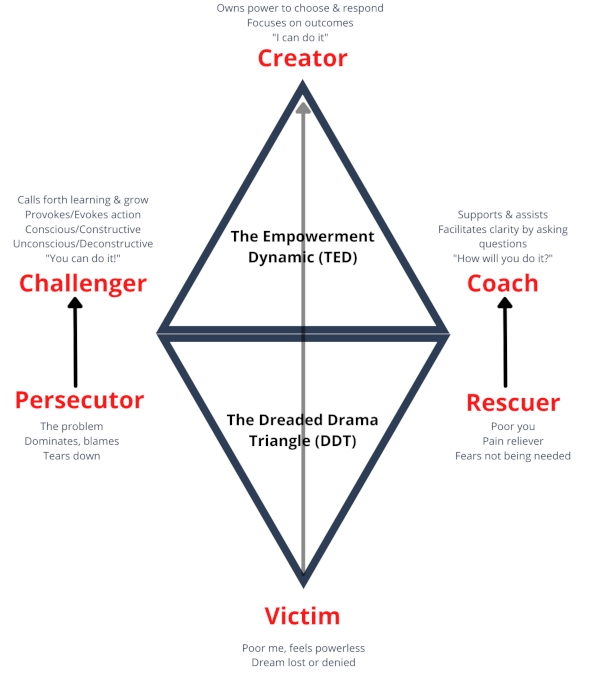Friday, July 19, 2024
(click here to listen to or read today’s scriptures)
The Empowerment Dynamic (TED)
O Lord, remember how faithfully and wholeheartedly I conducted myself in your presence, doing what was pleasing to you? Hezekiah, his face turned toward the wall, wept bitterly.
In society we are each part of several groups: one-on-one pairs, triangles and larger geometric shapes. I am thinking now especially of the triangle. In this biblical story the triangle includes King Hezekiah, Isaiah, and Yahweh (God).
After decades of faithful service to Yahweh and his people, Hezekiah is stricken with a deadly infection, a boil on his skin. God sends Isaiah to tell him he will soon die. After Isaiah leaves, Hezekiah pleads with Yahweh, reminding him of his faithful service.
God relents and tells Isaiah to return to the palace.
I have heard your prayer and seen your tears.
I will heal you: in three days you shall go up to the LORD’s temple;
I will add fifteen years to your life.
I will rescue you and this city from the hand of the king of Assyria;
I will be a shield to this city.”
Hezekiah’s response made all the difference, when he went straight to God. He did not kill Isaiah the messenger, nor did he remain silent. But I can imagine it going differently, as it often did for Jeremiah and Amos.
In psychologist Stephen Karpman’s drama triangle, which describes a common but ineffective form of relationship, there are three roles: victim, rescuer, and persecutor. Hezekiah felt victimized, and he might have seen Isaiah as persecuting him. God would have to rescue somebody.
Another likely scenario is Hezekiah becomes angry with God when he hears Isaiah’s word from the Lord. Then I can imagine Isaiah, especially if he agreed that Hezekiah was being treated unfairly, trying to fix things up with God. Hezekiah the victim sees God as his persecutor. If Isaiah’s boundaries were fragile, then he would become rescuer and ask God to relent.
Another name for this triangle is the Dreaded Drama Triangle, and you can see why. How do you get out of this mess when all you can do is move around exchanging roles, sometimes with lightning speed.
Here’s a brilliant way out, created by David Emerald Womeldorff. He calls it TED (The Empowerment Dynamic). Victim becomes creator, the persecutor is now a challenger, and the rescuer a coach. Creator-challenger-coach. From Wikipedia’s article on Karpman’s Drama Triangle:
Creator – victims are encouraged to be outcome-oriented as opposed to problem-oriented and take responsibility for choosing their response to life challenges. They should focus on resolving “dynamic tension” (the difference between current reality and the envisioned goal or outcome) by taking incremental steps toward the outcomes they are trying to achieve.
Challenger – a victim is encouraged to see a persecutor as a person (or situation) that forces the creator to clarify their needs, and focus on their learning and growth.
Coach – a rescuer should be encouraged to ask questions that are intended to help the individual to make informed choices. The key difference between a rescuer and a coach is that the coach sees the creator as capable of making choices and of solving their own problems. A coach asks questions that enable the creator to see the possibilities for positive action, and to focus on what they do want instead of what they don’t want.

Hezekiah heard the bad news but didn’t react violently. He laid down and “turned his face to the wall.” Weeping, he poured out his emotions to Yahweh, creatively pleading with God to change his mind. God wanted to challenge Hezekiah, not destroy him, and so he relented. After Isaiah heard the good news, he could coach his friend Hezekiah back to life.
Isaiah ordered a poultice of figs to be taken and applied to the boil, that Hezekiah might recover.
Isaiah the physician, Isaiah the prophet, Isaiah certainly had a way with words. As did Hezekiah himself, who wrote of his illness and recovery.
Like a shepherd’s tent my house has been pulled down and taken from me.
Like a weaver I have rolled up my life, and I am cut off from my loom.
Day and night you make an end of me.
I waited patiently till dawn, but like a lion you broke all my bones.
Day and night you made an end of me.
I would cry, “Lord, come to my aid!” But he himself has done this.
Then you restored me to health and let me live.
Surely it was for my benefit that I suffered such anguish.
But the grave cannot praise you, and death cannot sing your praise –
It is the living, the living! They praise you and parents tell their children
About your faithfulness.
And we will sing all the days of our lives in the temple of the Lord.
Not just Hezekiah. God always wants to challenge us, and never destroy us. The grave cannot praise, the dead do not sing. Blessed be the name of the Lord.
(Isaiah 38, John 10, Matthew 12)
(posted at www.davesandel.net)
#